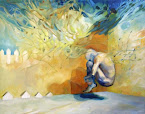




The David Gauntlett chapter, "Directions For Living," posed a good question. What is a role model? He went on to describe six different role models which are prominent in present or past media. I was a little surprised when I realized that most of these role model types are present in my mind.
My straightforward success role model would be Azadeh Moaveni who is an Iranian-American journalist (a foreign correspondent). She did struggle a bit when she was living in Iran, but that was after her successful career was well established. She and her German-Iranian husband now live in London with their son.
My triumph over difficult circumstances role model is Stephen Hawking who has a brilliant mind inside a very limited body. I don't pretend that I can comprehend the science of his writing and theorems, but I greatly admire his intelligence and success.
My challenging stereotypes role model is Queen Latifah who is female, black, slightly overweight, a lesbian, and ENTERTAINING! The thing is that I was a fan of hers long before I realized what stereotypes were. When she would guest star on "Fresh Prince of Bel Air" she cracked me up. I've read things about her and I've seen interviews and she just seems like a really decent person, which is always a refreshing thing from Hollywood.
My wholesome role model is Dr. James Dobson of Focus on the Family. My parents have been members of Focus on the Family since I could remember and I enjoyed reading the literature which Dr. Dobson would send to members. Though I didn't always agree with everything he wrote, I would always appreciate the good scholarship in which it was written.
My outsider role model is NOT Marilyn Manson. Ick. However I do agree with Gauntlett's sardonic parenthetical statement that these outsider types who defy conventions typically don't defy the conventional money which their denial of conventions rakes in by the truckload. I'm not entirely sure that I have an outsider role model.
My family role model is my mama, Sharon Elizabeth Hourigan. She could also be categorized as a triumph over difficult circumstances role model. She's had a difficult childhood, adolescence, and young adulthood. She is a good mother, a good wife, and a supportive Christian. As I am growing up I am beginning to know her as a fellow woman and that makes me admire her even more.
Those are my main role models. I have more under sub-categories of various things. However, considering what Gauntlett ultimately said about role models being, "inspiring or comforting figures who offer postive-looking examples of how life can be lived," (p.231) I feel confident that I have a diverse enough collection of influences to make something of myself and maybe even inspire a few people along the way.












